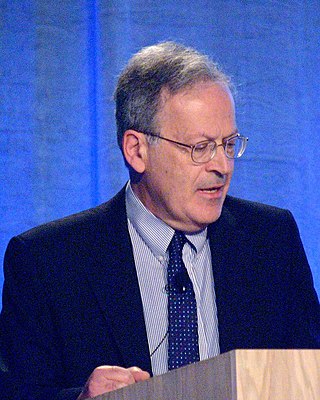Related Research Articles
Computer science is the study of the theoretical foundations of information and computation and their implementation and application in computer systems. One well known subject classification system for computer science is the ACM Computing Classification System devised by the Association for Computing Machinery.
Theoretical computer science is a subfield of computer science and mathematics that focuses on the abstract and mathematical foundations of computation.

The Gödel Prize is an annual prize for outstanding papers in the area of theoretical computer science, given jointly by the European Association for Theoretical Computer Science (EATCS) and the Association for Computing Machinery Special Interest Group on Algorithms and Computational Theory. The award is named in honor of Kurt Gödel. Gödel's connection to theoretical computer science is that he was the first to mention the "P versus NP" question, in a 1956 letter to John von Neumann in which Gödel asked whether a certain NP-complete problem could be solved in quadratic or linear time.

The European Association for Theoretical Computer Science (EATCS) is an international organization with a European focus, founded in 1972. Its aim is to facilitate the exchange of ideas and results among theoretical computer scientists as well as to stimulate cooperation between the theoretical and the practical community in computer science.

Leslie Gabriel Valiant is a British American computer scientist and computational theorist. He was born to a chemical engineer father and a translator mother. He is currently the T. Jefferson Coolidge Professor of Computer Science and Applied Mathematics at Harvard University. Valiant was awarded the Turing Award in 2010, having been described by the A.C.M. as a heroic figure in theoretical computer science and a role model for his courage and creativity in addressing some of the deepest unsolved problems in science; in particular for his "striking combination of depth and breadth".
ICALP, the International Colloquium on Automata, Languages, and Programming is an academic conference organized annually by the European Association for Theoretical Computer Science and held in different locations around Europe. Like most theoretical computer science conferences its contributions are strongly peer-reviewed. The articles have appeared in proceedings published by Springer in their Lecture Notes in Computer Science, but beginning in 2016 they are instead published by the Leibniz International Proceedings in Informatics.
ACM SIGACT or SIGACT is the Association for Computing Machinery Special Interest Group on Algorithms and Computation Theory, whose purpose is support of research in theoretical computer science. It was founded in 1968 by Patrick C. Fischer.

Arto Kustaa Salomaa is a Finnish mathematician and computer scientist. His research career, which spans over forty years, is focused on formal languages and automata theory.

Rajeev Alur is an American professor of computer science at the University of Pennsylvania who has made contributions to formal methods, programming languages, and automata theory, including notably the introduction of timed automata and nested words.

Kurt Mehlhorn is a German theoretical computer scientist. He has been a vice president of the Max Planck Society and is director of the Max Planck Institute for Computer Science.
DCFS, the International Workshop on Descriptional Complexity of Formal Systems is an annual academic conference in the field of computer science.
CIAA, the International Conference on Implementation and Application of Automata is an annual academic conference in the field of computer science. Its purpose is to bring together members of the academic, research, and industrial community who have an interest in the theory, implementation, and application of automata and related structures. There, the conference concerns research on all aspects of implementation and application of automata and related structures, including theoretical aspects. In 2000, the conference grew out of the Workshop on Implementation of Automata (WIA).

Yuri Gurevich, Professor Emeritus at the University of Michigan, is an American computer scientist and mathematician and the inventor of abstract state machines.
The Annual ACM Symposium on Theory of Computing (STOC) is an academic conference in the field of theoretical computer science. STOC has been organized annually since 1969, typically in May or June; the conference is sponsored by the Association for Computing Machinery special interest group SIGACT. Acceptance rate of STOC, averaged from 1970 to 2012, is 31%, with the rate of 29% in 2012.

Grzegorz Rozenberg is a Polish and Dutch computer scientist.
Gunther Schmidt is a German mathematician who works also in informatics.
Giorgio Ausiello is an Italian computer scientist. Born in 1941, in 1966 he graduated in physics under the supervision of Corrado Böhm. From 1966 to 1980, he served as a researcher at the Italian National Research Council (CNR). In 1980, he became a professor of compilers and operating systems at Sapienza University of Rome and since 1990 he has been a professor of theoretical computer science in the department of computer, control and management engineering, where he has been until recently the leader of the research group on algorithm engineering. At academic level Giorgio Ausiello has been chairman of the degree in computer engineering, director of the graduate school, then member of the academic senate and finally chairman of the research committee of Sapienza University. In 2012 he has been nominated professor emeritus of Sapienza University of Rome.
ACM SIGLOG or SIGLOG is the Association for Computing Machinery Special Interest Group on Logic and Computation. It publishes a news magazine, and has the annual ACM–IEEE Symposium on Logic in Computer Science (LICS) as its flagship conference. In addition, it publishes an online newsletter, the SIGLOG Monthly Bulletin, and "maintains close ties" with the related academic journal ACM Transactions on Computational Logic.
References
- M. Kudlek. "Report on DLT 2004". Bulletin of the EATCS 85:207-215, February 2005. (available for download)
- M. Daley. "Report on DLT 2006". Bulletin of the EATCS 90:227-229, October 2006. (available for download)
- M. Kudlek. "Report on DLT 2008". Bulletin of the EATCS 97:171-174, February 2009.
- M. Kudlek. "Report on DLT 2009". Bulletin of the EATCS 100:155-159, February 2010.
- M. Kudlek. "Report on DLT 2010". Bulletin of the EATCS 102:227-232, October 2010. (available for download)